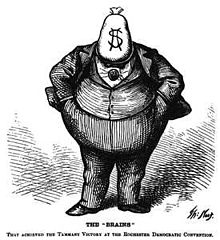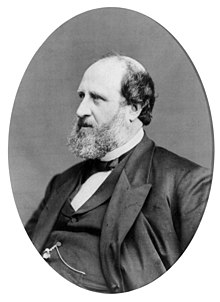William Tweed
William Magear Tweed (born April 3, 1823 in New York City , † April 12, 1878 ibid) was an American politician . The leader of the St. Tammany Society (better known as " Tammany Hall ") and the New York Democratic Party , which is ruled by this society, was the central figure in a far-reaching corruption scandal .
Life
Tweed, whose ancestors were Scottish Protestants , left school at the age of eleven to help his father in his chair-making workshop. In the following years he got on the wrong track and became notorious as the leader of a gang in his district under the name “ Big Bill ” - an allusion to his weight of around 150 kilograms. Tweed later joined the New York Fire Department and, at the age of 27, became the commander of the American Engine Company Number Six .
In 1852 Tweed was elected city councilor for the Democratic Party, in 1853 he became a member of the US House of Representatives for this party .
The dominant political force within the Democratic Party, which in turn was the dominant political force in New York, was the St. Tammany Society , which the immigrants from Europe took on in an effort to win them over as uncritical voters. In 1857 Tweed became "sachem" (section head) of the St. Tammany Society, in 1863 "grand sachem" (leader) and thus also chairman of the Democrats in New York. In this position, Tweed was the defining personality of New York politics and thus received his nickname "Boss Tweed". In 1868 Tweed also became a state senator .
The US professor Lawrence Lessig refers in a lecture to the statement of "Boss Tweed", where he said, "I don't care about the elections as long as I control the nomination of the candidates."
Corruption and bribery
At the height of his power, Tweed was the city's third largest landowner, director of the Erie Railway , director of Tenth National Bank and the New York Printing Company, owner of the Metropolitan Hotel, and president of the Americus Club in Greenwich, Conn. He owned two steam-powered yachts, a house on Fifth Avenue and a country house in Greenwich .
Tweed, who openly professed to be corrupt, used his position for personal gain as well as for the benefit of society. In the years of his political career, Tweed amassed a fortune in the tens of millions. Under his leadership, the St. Tammany Society also received $ 200 million from the public purse. This was done, among other things, by setting up control commissions which had to approve construction projects. In 1858, for example, the construction of the New York County Court House, which was initially estimated at $ 250,000, cost the city more than $ 12 million in the end.
From 1865 William Tweed and his three loyal friends Peter B. Sweeny , Richard B. Connolly and A. Oakey Hall ruled New York like despots .
When Tweed was appointed Commissioner of public works in New York in 1870 , he was able to carry out corruption on a large scale. He bought z. B. 300 benches for $ 5 each and sold to the city for $ 600. Tweed also organized the construction of City Hall Park (Rathauspark). The original estimated cost of $ 350,000 would be $ 13,000,000 upon completion.

In addition, Tweed made use of a wide variety of unfair means in order to retain power and to keep enriching itself. Immigrants were illegally granted residence permits in exchange for bribes. Officials and mandataries were also intimidated or, in turn, bribed . In addition, there were election fraud in New York, which went back to Tweed himself. Tweed also indirectly controlled the press by making the newspapers docile by placing well-paid advertising contracts from the local community or members of the Society.
Tweed was essentially overthrown by the well-known cartoonist Thomas Nast , who published in Harper's Weekly magazine and denounced the system of corruption and political arbitrariness surrounding Tweed in his drawings. Tweed soon learned to fear Nast; Tweed is supposed to have said: “ I don't care what the newspapers publish about me, since my sheep can't read anyway. But they understand these drawings. “They put pressure on the Harper brothers who edited the magazine. When they refused to fire Thomas Nast, they lost the contract to supply the New York schools with books. Nast himself was offered a $ 500,000 bribe to end his campaign. Although that was 100 times his salary, Nast refused to back down.
The crash
In the end, despite all the manipulation, the Democratic Party lost its majority. After the election of the Republican Ulysses S. Grant as US President , this was followed by the appointment of Edwards Pierrepont as federal prosecutor for the southern district of New York . He held this office until 1870, after which he acted as a member of the Committee of Seventy against corruption in New York around the party chairman Tweed in Tammany Hall.
On July 21, 1870, the New York Times published the contents of the New York State General Ledger. This revealed that thermometers cost $ 7,500 and brooms cost a whopping $ 41,190 each. Tweed's friends were entrusted with the work. George Miller, a carpenter, made $ 360,747 for a month's labor, while James Ingersoll got $ 5,691,144 for furniture and carpets.
In 1871, Samuel J. Tilden set up a committee of inquiry to shed light on Tweed's activities. Jimmy O'Brien , Sheriff of New York, was of the opinion that Tweed is not it enough bribe paying, and provided the Committee with incriminating documents.
In 1874 Tweed was charged with massive corruption and several capital crimes and sentenced to twelve years in prison. When he was about to be released on bail in 1875 , he could not pay. On December 4, 1875, he used an approved exit and fled to Cuba . There he embarked for Spain , where Tweed was caught in Vigo by a Spanish gendarme. This gendarme Tweed was recognized because of the cartoons Nast, as s characteristics were used, although he - due to its use as a profile caricature - took the view that because of Tweed kidnapping 'm wanted.
Tweed was extradited to the United States in 1876, where he died two years later in New York City's Ludlow Street Jail . William Tweed was buried in Green-Wood Cemetery , Brooklyn . The coffin was only accompanied by four carriages and no one was interested in the funeral procession.
After the fall of William Tweed, the Tammany Society was reorganized by John Kelly . Members of the Tammany Society were soon back in power, deciding who should be Mayor of New York City.
Trivia
In the American film Gangs of New York by Martin Scorsese , released in 2002, Tweed is portrayed by Jim Broadbent .
In an episode of Our Little Farm (class representative vote), Laura Ingalls draws a caricature of Nellie Oleson, who portrays Nellie as Nellie Boss Tweed.
Claudio S. Grafulla wrote a Quick Step for Tweed in 1870 entitled Solid Men to the Front .
sources
- Tweed, William Marcy - page 79 ff Dictionary of American biography. Vol. 19., Edited by Dumas Malone. Publisher: C. Scribner's Sons New York, 1943
literature
- A New York millionaire . In: Die Gartenlaube, Heft 1, 1874. (contemporary report on the corruption affair) Online version at Wikisource
- Kenneth D. Ackerman : Boss Tweed . Publisher: Viral History Press LLC, 2011 ISBN 978-1-6194-5002-8
- Gustavus Myers: The history of Tammany Hall . First edition 1901. Foreword to the new edition 1917. Publisher: Boni & Liveright New York 1917 - on the Internet Archive - online
- Boss Tweed in Court - University Publications of America 1990
Web links
- William Tweed in the Biographical Directory of the United States Congress (English)
- Famous Resident: William William Magear (“Boss”) Tweed - from Brooklyn's Green-Wood Cemetery, New York's Buried Treasure by Jeffrey I. Richman
- Boss Tweed in Digital History
Individual evidence
- ↑ Lawrence Lessig: Our democracy no longer represents the people. Here's how we fix it. (Video) TED , 2015, accessed January 19, 2020 .
- ↑ Reviving Greenwich's 'Most Conspicuous House' By CHRISTOPHER GRAY New York Times Published: May 18, 1997
- ↑ cf. http://www.city-journal.org/html/thomas-nast-americas-premier-political-cartoonist-12575.html ; see http://www.americanheritage.com/content/life-and-death-thomas-nast?page=2 , http://cbrowder.blogspot.de/2013/08/79-tweed-at-end-i -have-tried-to-do-some.html , http://oldprintshop.com/product/142408 , http://www.thepoliticalbandwagon.com/articles/2003June.html
- ↑ Solid Men to the Front on the website of the Lester S. Levy Collection of Sheet Music at Johns Hopkins University
| personal data | |
|---|---|
| SURNAME | Tweed, William |
| ALTERNATIVE NAMES | Tweed, William Marcy |
| BRIEF DESCRIPTION | American Democratic Party politician |
| DATE OF BIRTH | April 3, 1823 |
| PLACE OF BIRTH | New York City |
| DATE OF DEATH | April 12, 1878 |
| Place of death | New York City |




